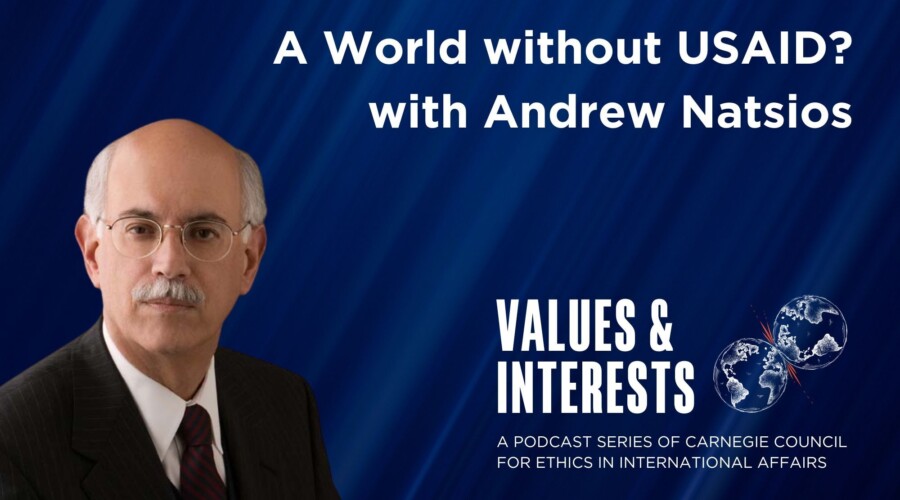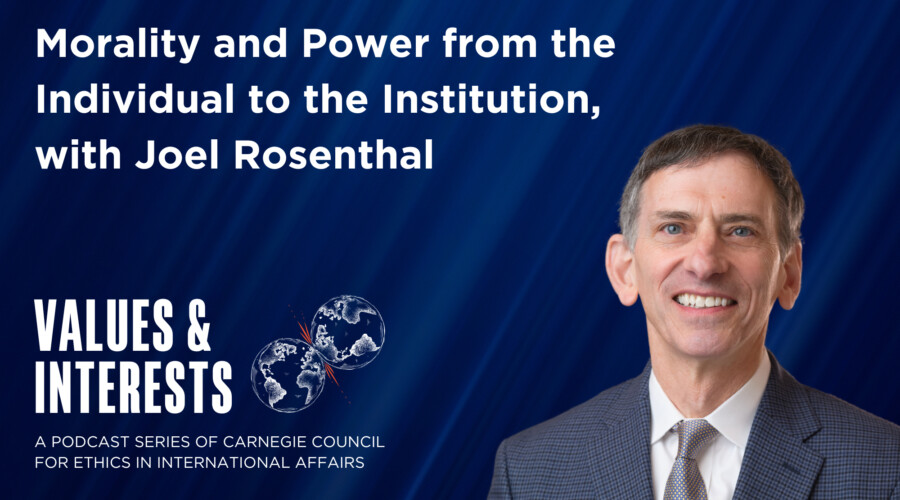As part of its third annual SEPTEMBER SUSTAINABILITY
MONTH, the Carnegie Council for Ethics in International Affairs is giving special recognition to New York City Mayor Michael Bloomberg. This profile explains why.
If you have recently wandered New York City's streets, you may have had the puzzling
feeling that you were in Amsterdam, Copenhagen or Portland. The prompt for that
confusion: a bright green, two-way bike lane nestled between a row of parked cars
and the sidewalk, with a steady stream of people pedaling by. This scene would
have been unimaginable even ten years ago in a city reputed for its inhospitality
towards cyclists, but it's one that has become common under the leadership of
Mayor Michael Bloomberg. His administration has added hundreds of miles of bike
lanes during his tenure in an effort to reduce automobile traffic and improve
air quality.
A bike lane is a tiny lens through which to view Bloomberg's overarching environmental
agenda, which elegantly connects local change to global strategy. Pursuing a broad
agenda has sparked its share of controversy, yet though Bloomberg's critics may
cite procedure, cost, or fear of change, they never challenge the ethical underpinnings
of his initiatives. It is for his values-based vision and environmental leadership
that the Carnegie Council for Ethics in International Affairs honors Mayor Michael
Bloomberg as part of our September Sustainability Month.
Bloomberg has used the pulpit of his office to address climate change on the global
stage. While contributing greatly to the causes of climate change, Bloomberg argues,
cities have an equally great opportunity to spearhead its solution. Because of
cities' dense populations, inefficiencies are easier to find. Once identified,
they can be more easily reformed due to municipal governments' direct authority
over building codes, public space, and transportation systems.
Bloomberg works with cities around the globe to find policy solutions to address
these inefficiencies. He currently serves as chairman of the C40,
an organization of mayors of the world's largest cities committed to reducing
carbon emissions and adapting to climate change. Bloomberg has endeavored to make
New York City a model to the C40, a laboratory for scalable and replicable solutions.
To this end, Bloomberg announced PlaNYC
on EarthDay 2007. It's an extensive 25-year plan to make New York the world's
"first environmentally sustainable 21st-century city." The plan is comprehensive
and actionable, with 127 projects, regulations, and innovations that span six
focus areas. This goal-oriented approach makes New York a testing ground to evaluate
the impact of environmentally sustainable policy while simultaneously improving
the city's practices.
One of PlaNYC's centerpieces is the MillionTreesNYC, which set the goal of planting
one million trees across the city; more than half have been planted so far. Alex
Felson, a Yale professor, landscape architect and urban ecologist, has worked
as a consultant with the Parks and Recreation Department on the MillionTreesNYC.
He described the project as more than a large-scale Arbor
Day; rather, it's an enormous long-term ecological experiment. Scientists
are collaborating with parks managers to establish, maintain and study urban forests
and their effects on the city. Felson praised the project's analytical nature
and Bloomberg's creation of an environment of collaboration among government agencies.
"We were able to achieve an unprecedented project during this innovative
period of time," he said.
Pushing for dramatic, rapid change is never an easy political proposition and
Bloomberg's vision of New York as a lab for new policies has garnered some criticism.
PlaNYC's strength is also its weakness; its broad scope raises concerns among
community activists about the risks of being a first mover. By implementing Bloomberg's
goals along such an ambitious timeline, some worry about unintended repercussions.
Peggy
M.Shepard is executive director of WE
ACT for Environmental Justice and a member of the PlaNYC Advisory Board, which
counsels Bloomberg on environmental policy. She complimented Bloomberg's environmental
agenda but said because PlaNYC "is a very broad plan, I would simply like
to see a better evaluation at the community level, by community board districts,
to see how these broad initiatives are impacting communities."
Better evaluating the effect of policies could increase the utility of New York's
global leadership in sustainability, but some of PlaNYC's boldest and potentially
far-reaching proposals have failed to gain support at the state level. The most
publicized example is Bloomberg's attempt to introduce a congestion pricing plan
in Manhattan, which would have reduced the amount of automobile traffic and improved
air quality while generating money for the city to improve mass transit. Innovative
policies like the congestion pricing plan will be crucial in reducing the human
impact on climate change for the future but, inopportunely, many have been stalled
by politicians in Albany.
Inaction at state, federal and international levels of government have been the
most frustrating for Bloomberg, according to Dr. Rohit
Aggarwala. He served as director of New York City's Office of Long-Term Planning
and Sustainability, and is currently special advisor to Bloomberg as chair of
the C40 and a program manager for Bloomberg Philanthropies. Aggarwala says cities
are often more likely to act on climate issues than broader levels of government,
pointing to the opposition some of PlaNYC's initiatives have met at the state
level. "Where the city has been able to act on its own behalf," he says,
"it has made great progress." For example, New York City has been able
to phase out buildings' use of low-grade, highly-polluting heating oils without
requiring state approval. Aggarwala also cited Bloomberg's frustration with the
federal government's limited response to issues of climate change. Aggarwala said
that frustration prompted Bloomberg to use his own wealth instead, citing a recent
$50 million contribution to the Sierra Club's Beyond
Coal Campaign. "Congress has essentially abdicated leadership on these
issues," he said, "If they're not going to do it, Mike Bloomberg is
the kind of guy who will step up to see it done."
In the end, it is Bloomberg's personal dedication to the issue and willingness
to risk the temporary consequences within New York's borders in pursuit of his
global vision of New York as a sustainable "city on a hill" that are
laudable. The globe will need a leader to light the way in sustainable practices
and Bloomberg should be applauded for recognizing this and demanding of New York,
as he did on Earth Day 2007, "If we don't act now, when? And if we don't
act, who will?"




